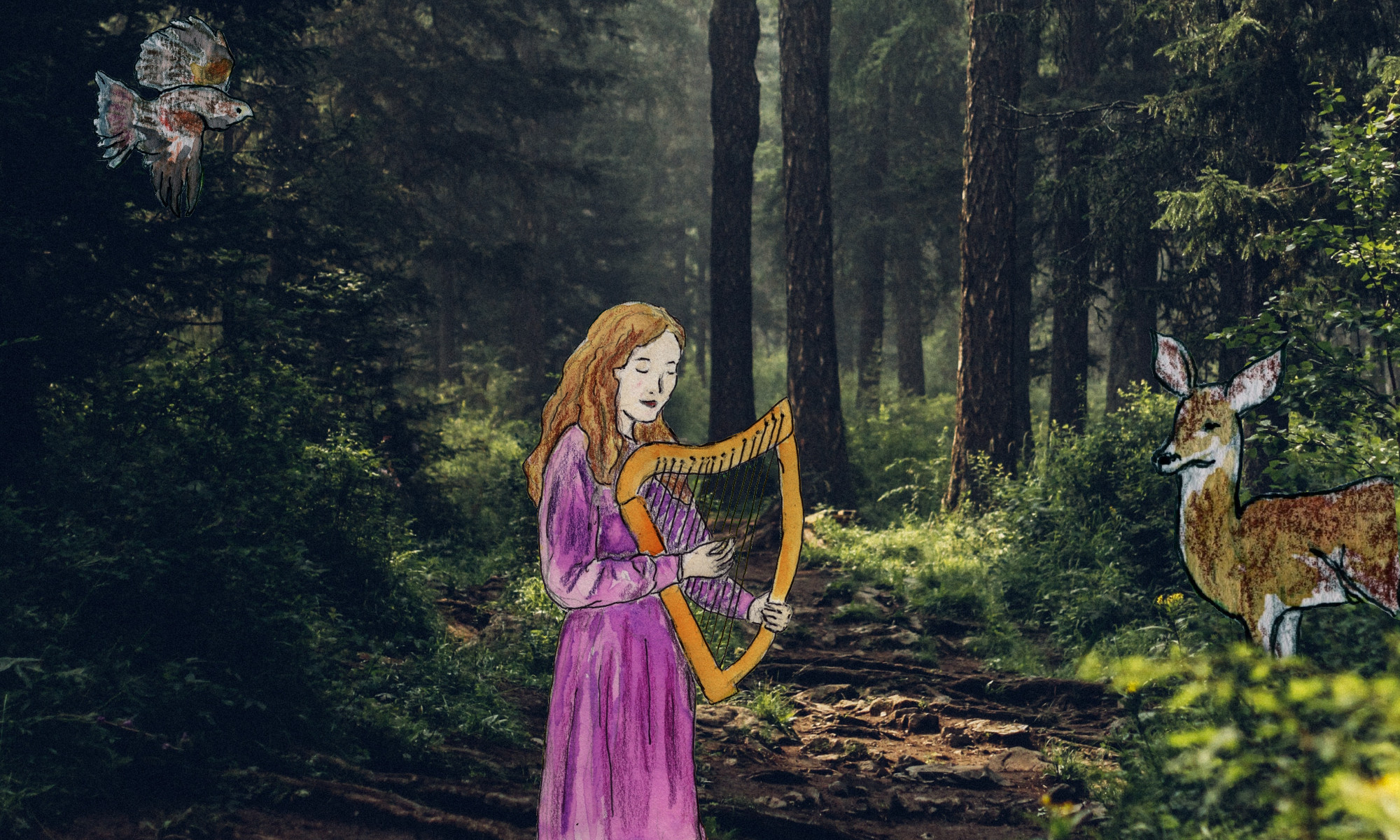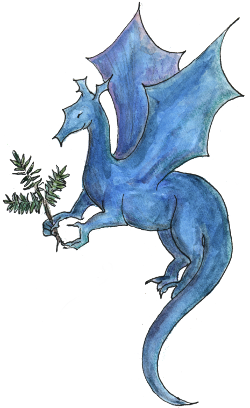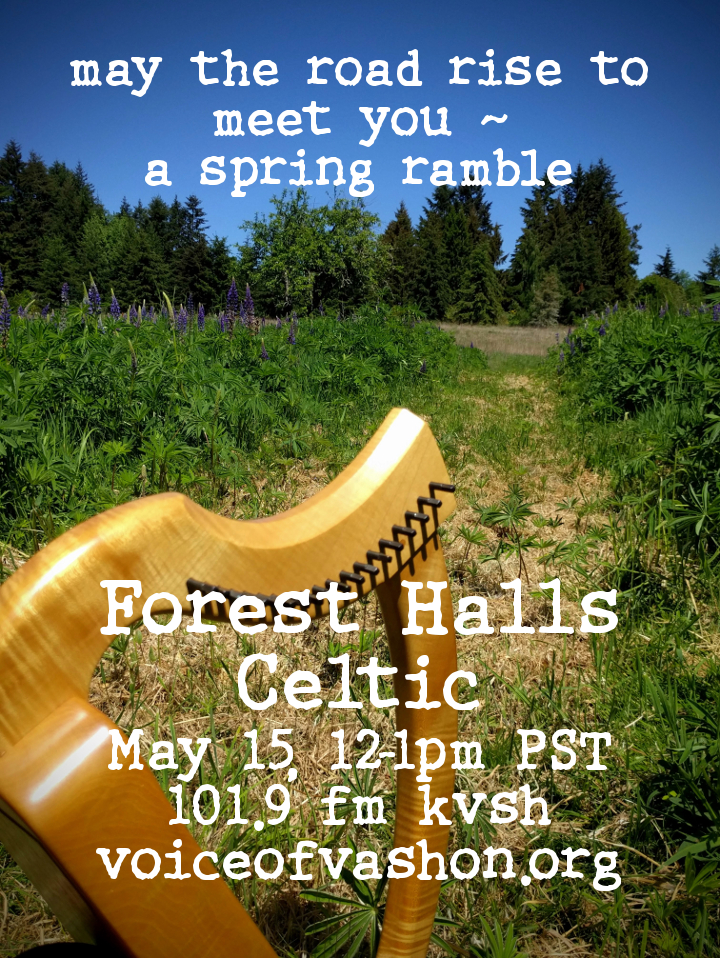Here’s a little more detail about the music and tales we experienced in Forest Halls Celtic – 4/3/16 (you can listen to the show on demand at that link).
Access the 4/3/16 show’s play list here.
A Celebration of Spring.
Opening and Closing music (excerpts): “Lochaber No More” – Spookytree (Masque).
Two wire-strung harps play this traditional Scottish tune. Though it’s a lament, the tune showcases well the beauty and ring of two wire-strung harps playing together. You can listen to the full piece here.
Welcome to Forest Halls Celtic!
Field, Farmyard, and Cottage:
“The Magic Horse” – Paul Machlis (The Magic Horse)
This track has been a favorite with my family since the mid-90s. Paul Machlis, is a pianist and keyboardist from the Santa Cruz area of California. In 1992 he released The Magic Horse – a CD of original compositions based mostly on Celtic and Balkan themes, and you can hear both those musical streams in the title track.
“The Hen’s March” – Bonnie Rideout (Gi’me Elbow Room: Folk Songs of a Scottish Childhood)
Bonnie Rideout is a Scottish fiddler from America! “The Hen’s March” is actually “The Hen’s March o’er the Middens.” Listen carefully to the tune itself: You can hear the hens cackling and scratching. The second tune/song in this set is “Tail Toddle,” which you hear both as an instrumental and as an example of Scottish mouth music. I included this track in honor of the arrival of a batch of baby chicks to our house.
Gi’me Elbow Room is Bonnie’s album introducing Scottish music to kids.
Thank you to Great Highland pipes and Scottish small pipes player — a new harper — Joyce Newport for i.d.’ing “Tail Toddle” for me! And also to the folks at Bonnie Rideout’s office for doing the same. I welcome corrections/additional info from listeners!
Scottish Set: “Lochnagar / Miss Gordon of Fochabers / Jenny Dang the Weaver / The Fairy Dance” – Natalie MacMaster (Natalie MacMaster: Fiddling in Reel Time, Ted Talk 2003)
Imagine growing up in an area where music is so very much a part of the community life, and there are so many fiddle players around that something like the following is a common occurrence. Your house has a fiddle, just as every house does. A neighbor drops by. You hand over your family’s fiddle, because 10 to 1 that person can play it. You invite your neighbor to play a tune. Soon someone starts dancing, and then other person offers a song, and this kitchen party starts up with tunes and songs going round and folks joining in.
Well, Cape Breton Island, in Nova Scotia, in northeastern Canada is just such a region. The people of Cape Breton originally came from Scotland, and so their music and all the traditions that go with it are from Scotland. Natalie MacMaster is an energetic Cape Breton fiddler who grew up in this kind of musical community life. Her style ranges from traditional to progressive and fusion, but is always rooted in her deep love of her Cape Breton heritage. Here are a set of Scottish tunes that she played in a Ted Talk in 2003. The tunes are: Lochnagar, Miss Gordon of Fochabers, Jenny Dang the Weaver, and The Fairy Dance. Imagine that Natalie’s playing these tunes in your kitchen! Don’t you feel like dancing while you’re chopping your kale or stir-frying your spring nettles? Maybe you feel like adding a tune or song of your own too?
Thank you to Cherry Clark of the San Francisco Scottish Fiddlers for identifying the tunes for us!
Sunshine through the Window (Irish, 9th c.)
It’s a beautiful day 1200 years ago. In Ireland and Scotland, monks set to their work of transcribing the Bible or psalms or other sacred work. They transcribe with glorious calligraphy and with intricate knotwork patterns and fanciful animals. From time to time in these incredible works, they scrawl in the margin—a reflection, sometimes a poem or snippet of song.
Here is a marginal note by an unknown Irish scribe in the 9th century. Maybe you’ve had similar thoughts as you’ve bent over your lap top, tablet, or cell phone, pursuing the work of the day.
Pleasant to me is the glittering of the sun today upon these margins, because it flickers so.
– Irish; marginal note by an unknown scribe, 9th century.
From A Celtic Miscellany – compiled by Kenneth Jackson
The Breton Tunes:
Brittany is a Celtic region of France.
“Dans Keff Avec” – Steve Baughman with Robin Bullock (Life in Prism)
Robin Bullock, a Celtic+Appalachian+American guitarist multi-instrumentalist teams up with California fingerstylist Steve Baughman in this lovely traditional dance tune from Brittany . Precise harmonies, relaxed playing, pure magic!
“An Dro in Em / Breton March / Bus Stop”- Cíana (Loneliest Road)
As their website declares, Cíana indeed features of high-octane Irish Trad with a Nevada flair! This set begins with two traditional tunes from Brittany. Presumably, the last tune is from Nevada.
“Home and the Heartland” (Riverdance 1995)
This song was composed by Bill Whelan for Riverdance. It isperformed by Anuna, with soloist Katie McCahan, during its premiere run in 1995. Anuna is an Irish vocal ensemble whoose songs and intricate harmonies and interwoven arrangements evoke universal truths told through the landscape, the philosophy and the mythology of Ireland and beyond.
An Irish Myth: Airmid’s Cloak
“Airmid’s Cloak” told by Jane Valencia
I have been entranced by the Irish legend of “Airmid’s Cloak” since I first encountered it via the Order of Bards, Ovates, and Druids. This tale contains a beautiful scene where a veritable herb garden grows out of brutality and tragedy. Dian Cecht, one of the Tuatha De Danaan, a physician and god of healing, in a fit of rage, murders his son Miach for surpassing him in healing abilities (Do no harm???). Airmid, Miach’s sister and a healer as well, visits Miach’s grave through the winter. Then spring comes, and the flowers emerge. Airmid is confused then awed when she discovers that 365 herbs have grown at the grave in the shape of her brother. Soon she realizes that all of the healing knowledge and wisdom of Airmid’s brother, Miach, is revealed in those plants, and that each herb can heal the area of the body in which it grows.
Laying her cloak on the ground, Airmid sets about placing each herb on it in the place it grew over her brother’s body so that she can catalogue each one and spread the knowledge. But Dian Cecht returns …
I tell a short version of this story with a backdrop of Chris Conway’s appropriate music, “Airmid’s Herbal Cloak.”
In future shows we’ll see about reassembling that herbal cloak as I share with a little Celtic herbal lore and wisdom.
Thank you again to my friend and colleague – harper, vocalist, cellist and amazing linguist, Vicki Parrish of The Standing Stones for pronunciation guidance (any mangling of Irish Gaelic pronunciation is my own!).
“Airmid’s Herbal Cloak” – Chris Conway (Celtic Gold)
Chris Conway is a British multi-instrumentalist who plays in a variety of genres. His Celtic Gold album is Celtic music for relaxation and healing.
“Frogsong” – Kim Angelis (The Messenger)
Kim Angelis composes and performs beautiful, passionate music for virtuoso violin, with a Gypsy flavor, classical style, and occasional zaniness. This particular piece is fun, light and inspired – frogs need their own song too. I love the music of Kim Angelis, and she is a lovely, heartful person as well!
The Harp Music.
Do you enjoy the Celtic harp? The rest of the program includes harps in various ways!
“The Hawk of Ballyshannon” by Ruaidhrí Dall Ó Catháin – Ann Heymann (Queen of Harps)
Each show showcases the wire-strung harp, also known as a clarsach or Gaelic harp.
From her website: “A master in the performance and traditions of the Gaelic harp, Ann Heymann continues to spearhead the instrument’s revival. From the start she chose to play in the traditional manner: resting the harp on her left shoulder so the right hand plays the bass and the left hand plays the treble, striking the brass strings with her fingernails, and damping with the fingerpads.”
Ann is an elegant and masterful player, as you will soon hear.
Here Ann performs ancient Irish harp piece, The Hawk of Ballyshannon, from the Bunting collection (which is a story in itself, for another time!). The tune was composed by an Irish harper, Ruaidhrí Dall Ó Catháin — also known as “Blind Rory” (many harpers during that time were blind) — around 1600.
On the subject of wire-strung harps: A shout out to Nan Pardew, who has shepherded a wire-strung harp circle for many years now in the Puget Sound area. One is happening this very afternoon. Thanks, Nan, for your dedication and for being a strong voice for the wire-strung harp!
“Dacw ‘nghariad (There is my love)” – Eve Goodman (Sofar Cardiff house concert)
Eve Goodman is a 20-year-old singer/songwriter from Caernarfon, North Wales who is currently studying at Cardiff University. Here she sings a traditional Welsh song. This recording is from aSofar Cardiff house concert. A Sofar is an intimate, invite-only performance event – the best new music played in unique spaces, to passionate audiences.
The song begins (translated):
There’s my love down in the orchard
Oh, how I wish I was there myself …
Where’s the harp in this song? Check out the final verse, below.
There’s the harp, there the strings
What am I with no one to play it?
There’s the lively, careful maiden
How much closer am I to winning her?
“Canan Nan Gaidheal” by Murdo MacFarlane – Clan Alba (Clan Alba)
A folk supergroup, Clan Alba formed in the UK in the mid-90s with veteran artists Dick Gaughan, Mary Macmaster, Brian MacNeill, Fred Morrison, Patsy Seddon, Davy Steele, Mike Travis and Dave Tulloch. While the instrumental line-up featured guitars, harps, pipes, fiddles and percussion, just as much interest was focused on how well the distinctive singing voices blended as part of Clan Alba’s collective harmonies. .
For you harp afficianados:
Patsy Seddon and Mary Macmaster of the Scottish harp duo Sileas, and the all-female folk group The Poozies offer harps and vocals on this song.
“Come with me, come away to the West,
Where we shall hear the language of the great warriors;
Come with me, come away to the West
Where we shall hear the language of the Gaels“
“The Butterfly” – Orison (Orison: Celtic and Contemporary Instrumental Music)
Orison comprises five San Francisco Bay Area instrumentalists: William Coulter on guitars, Steve Coulter on harp and recorder, Shelley Phillips on oboe, English horn and flute, Barry Philips on cello and percussion, and Anne Cleveland on flute.The Butterfly is an Irish slip jig played here in three different time signatures, 9/8, and altered 9/8 (2 + 2 + 2 + 3), and 11/8 (2 + 2 + 3 + 2 + 2). These rhythms are borrowed from Bulgarian folk music.


